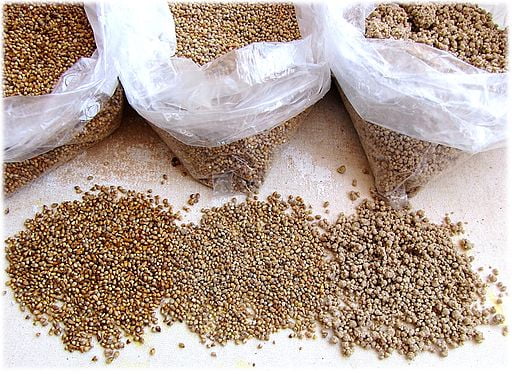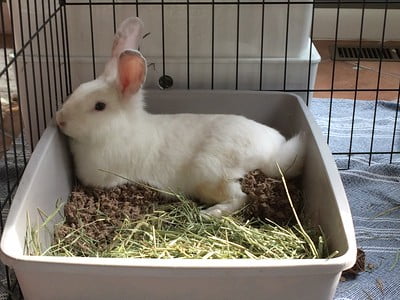Last Updated on March 7, 2023 by Marjon Ramos
Cashew has been used in several studies involving rabbits as a substitute substance in animal feeds.
What they found was that cashew can be used in animal feed without affecting the health of the animals.
But, the studies I mentioned assume that your rabbit is a meat rabbit.
Meat rabbits need to grow fast for them to be economically viable, so farmers are using all kinds of tricks to make their rabbits grow fast without affecting their health in the short term.
As for pet rabbits, feeding cashew can do more harm than good because it’s too high in fat and starch.
Rabbits that are fed high amounts of fat for long periods of time could suffer some serious health issues like diarrhea, obesity, hepatic lipidosis, and GI stasis.
100 grams of cashews contain 44 grams of fat and 23.49 grams of starch, while rabbits should limit themselves to 0–138 grams of starch, meaning rabbits can be fine with or without any starch in their diet.
Rabbits should also limit themselves to 20-50 grams of fat per day.
Additionally, cashews have been reported to contain the aspergillus fungi, which can produce mycotoxins like aflatoxins.
Rabbits are one of the most sensitive species to aflatoxins.
Rabbits that are suffering from toxicity can experience anorexia, diarrhea, depression, reduced weight gain, and high mortality.
If you notice any changes in your rabbit’s stool, both in size and consistency, or any changes in their behavior after eating cashews, immediately bring your rabbit to a veterinarian.
Now that I’ve given you the gist of the article, read on as I explain in more detail why rabbits can’t eat cashews:
Table of Contents
Risk of overfeeding cashew to rabbits.
Fatty and starchy foods like cashews should not be fed to rabbits intentionally.
They carry certain risks when fed in large amounts.
Rabbits’ digestive systems are not really designed to digest large amounts of food like cashew.
Here are some of the risks associated with feeding your rabbits large amounts of cashew :
Fatty liver disease
Most cashews are high in fat, feeding your rabbits cashews long-term could lead to hepatic lipidosis, or fatty liver disease.
A rabbit’s diet should only consist of less than 3% fat, while cashew is high in fat.
Here are the signs that your rabbit might be suffering from fatty liver disease caused by excess fat:
- Loss of appetite (anorexia) – may be sudden or gradual.
- Weight loss
- Decline in number and size of droppings (feces)
- Dehydration
- Depression and lethargy
Aflatoxin poisoning
Some cashews may have unsafe levels of aflatoxins that can make pets and humans sick.
Rabbits are one of the most sensitive species to aflatoxins, which is why it’s not recommended for them to consume any food that might contain them, like corn, nuts, cottonseed, and tree nuts.
Here are the most common symptoms of aflatoxin poisoning in rabbits:
- Diarrhea
- Anorexia
- Jaundice
- Loss of appetite
- Reduced weight gains
- High mortality
- Depression
If you notice or suspect that your rabbit might be suffering from aflatoxin poisoning, immediately call your veterinarian or the animal poison control hotline.
Diarrhea
Diarrhea in rabbits is often caused by the wrong diet or when the diet is changed too fast.
Feeding your rabbit large amounts of cashews would check those two boxes I mentioned.
Gastrointestinal Stasis
Gastrointestinal stasis is also possible when a rabbit is fed large amounts of cashews, which are high in fat.
GI stasis mainly happens when a rabbit is fed a low-fiber diet.
GI stasis happens when the balance of bacteria in your rabbit’s gut is disrupted.
This disruption would cause painful gas that would eventually lead to organ failure and death if not treated immediately.
The signs of GI stasis are:
- Depressed
- Hunched posture
- Bruxism
- Decreased appetite/anorexia
If you notice any of these signs, immediately bring your rabbit to a veterinarian.
Uneaten cecotropes
Soft uneaten cecotropes are also possible when rabbits are eating large amounts of cashew instead of hay.
This could lead to softer cecotropes due to the lack of fiber in your rabbit’s diet.
Obesity
Obesity in rabbits is also possible when fed large amounts of starchy food.
Rabbits that are confined in cages all day without exercise and fed large amounts of high-carb, low-fiber diets are the most susceptible to obesity.
Healthy alternative to cashew as treats.
If you are planning on giving your rabbits cashews as treats, these alternatives are much healthier.
Here are some alternatives that you can give to your rabbits one to two times per week as a treat:
- Melon
- Nectarine
- Apple (remove seeds)
- Banana
- Papaya
- Peach
- blueberries
- blackberries
- Pear
- strawberries
- raspberries
- cranberries
- Pineapple
- Plum
- Watermelon
- Cherries (remove seeds)
- Grapes
- Orange
FAQ (Frequently Asked Questions)
Should you panic if your rabbit ate a little bit of cashew?
While cashew is not recommended for rabbits, it’s still not toxic.
It’s just that cashews are too high in fat and starch, both of which are not digested well by rabbits.
If you’re worried about the potential for aflatoxin toxicity, just observe your rabbit for any additional symptoms like loss of appetite, depression, jaundice, and diarrhea.
You can also call the poison control hotline if you suspect or are worried that your rabbit is experiencing intoxication.
If you are worried, just feed them a lot of hay.
The extra fiber would likely fix the problem on its own.
What to do if your rabbit ate a cashew?
Observe their behavior and poop for any changes.
You should also feed them a lot of hay.
The extra fiber would help balance their gut flora.
If you notice any changes in their poop or behavior, consult a veterinarian immediately.
Conclusion
Cashews should never be fed to rabbits intentionally because they could potentially contain aflatoxins.
Also, rabbits that are fed large amounts of fatty and starchy foods like cashew could lead to digestive distress like diarrhea, fatty liver disease, and GI stasis.
It could also lead to obesity, especially in rabbits who are confined in small cages all day without access to regular exercise.
If your rabbit is exhibiting signs of digestive distress, immediately bring them to a veterinarian.
Cite this article:
Sources
- Cashew in Breeding: Research synthesis
- DETERMINATION OF AFLATOXIN LEVELS IN CASHEWS ON TURKISH MARKETS
- Nuts, raw, cashew nuts
Image credit – hz_westfalen_de on Pixabay, CC0, via Wikimedia Commons




